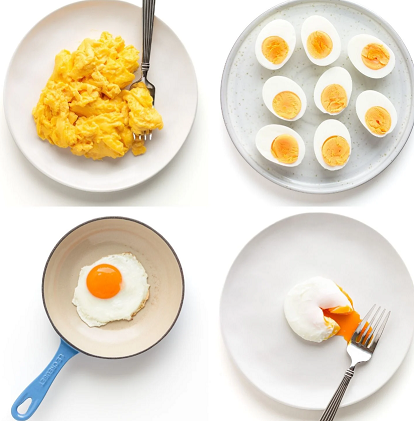In this article, we’ll share some top egg tips for cooking eggs that will help you achieve perfectly cooked eggs every time, whether you like them soft-boiled, hard-boiled, scrambled, fried, or poached. Eggs are a versatile and delicious ingredient that can be cooked in various ways to create a wide range of dishes. Whether you’re a seasoned cook or a beginner in the kitchen, mastering the art of cooking eggs can elevate your culinary skills to new heights. So, let’s crack on and explore the secrets to egg-cellent egg cooking!

Egg Tip 1: Use Fresh Eggs
Using fresh eggs is essential for achieving the best results when cooking eggs. Fresh eggs have firmer whites and yolks, which hold their shape better during cooking. To determine if an egg is fresh, you can perform the “float test.” Place an egg in a bowl of water; if it sinks and lies horizontally, it’s fresh. If it stands upright or floats, it’s not as fresh and may not cook as well.
Egg Tip 2: Control the Heat
Controlling the heat is crucial when cooking eggs to avoid overcooking or undercooking. For most egg dishes, using medium to low heat is recommended. High heat can cause eggs to cook too quickly and result in uneven textures. Adjust the heat as needed to ensure gentle and even cooking.
Egg Tip 3: Season Eggs Properly
Proper seasoning can elevate the flavor of eggs. Seasoning eggs with salt and pepper or other herbs and spices during cooking can enhance their taste. Be mindful of the amount of seasoning used, as eggs can easily be over-seasoned. Start with a small amount and adjust to taste.
Egg Tip 4: Pay Attention to Cooking Times
Cooking times play a critical role in achieving the desired consistency of eggs. Soft-boiled eggs typically require 4-5 minutes of cooking, medium-boiled eggs need 6-7 minutes, and hard-boiled eggs take 9-12 minutes, depending on your desired yolk consistency. Keep a timer handy and monitor the cooking time closely to avoid overcooking or undercooking.
Egg Tip 5: Experiment with Different Cooking Methods
Eggs can be cooked in various ways, including scrambling, frying, poaching, boiling, and baking. Experiment with different cooking methods to discover your favorite ways to enjoy eggs. Each method requires different techniques and timing, so be willing to try and learn from your results.
Egg Tip 6: Use Non-Stick Cookware or Add Fat
To prevent eggs from sticking to the pan, use non-stick cookware or add a small amount of butter, oil, or cooking spray to the pan before cooking. This will help you achieve evenly cooked eggs with less risk of sticking.
Egg Tip 7: Let Eggs Rest Before Serving
After cooking eggs, allow them to rest for a moment before serving. This will help the eggs set and finish cooking from the residual heat, resulting in a more evenly cooked and flavorful dish.
Eggs are a versatile ingredient that can be transformed into delicious meals with the right techniques. By using fresh eggs, controlling the heat, seasoning properly, paying attention to cooking times, experimenting with different methods, using non-stick cookware or adding fat, and letting eggs rest before serving, you can achieve perfectly cooked eggs every time. So, go ahead and put these tips into practice to master the art of cooking eggs and impress your family and friends with egg-cellent dishes! Happy cooking!
How to make hard-boiled eggs with a runny yolk?
If you prefer hard-boiled eggs with a runny yolk, you can follow these tips to achieve the desired result:
- Start with room temperature eggs: Using eggs that are not too cold straight from the refrigerator can help ensure more consistent cooking and prevent cracking. Allow your eggs to come to room temperature before boiling them by placing them in a bowl of warm water for a few minutes.
- Place eggs in a single layer in a saucepan: Arrange the eggs in a single layer in a saucepan to ensure even cooking. Avoid overcrowding the pan, as it may result in uneven cooking and inconsistent yolk consistency.
- Cover eggs with water: Add enough water to the saucepan to cover the eggs by about an inch or so. This will allow for proper heat distribution and prevent the eggs from cracking while cooking.
- Bring to a gentle boil: Place the saucepan with the eggs and water over medium-high heat and bring it to a gentle boil. Once the water reaches a gentle boil, reduce the heat to low or medium-low to maintain a simmer.
- Cook for 9-12 minutes: For a runny yolk, cook the eggs for 9-10 minutes. For a slightly thicker, but still runny yolk, cook for 11-12 minutes. Keep in mind that cooking times may vary slightly depending on the size of the eggs and the altitude of your location, so it’s best to keep an eye on them and adjust as needed.
- Cool and peel: Once the desired cooking time is reached, carefully transfer the eggs to a bowl of ice water using a slotted spoon to stop the cooking process and cool them down quickly. Let the eggs sit in the ice water for a few minutes to cool completely before peeling.
By following these tips, you should be able to achieve hard-boiled eggs with a runny yolk to your liking. Remember to adjust the cooking time based on your preference and experiment to find the perfect timing for your desired yolk consistency.
We hope these egg tips make you a better egg cook.








